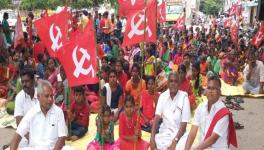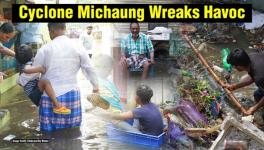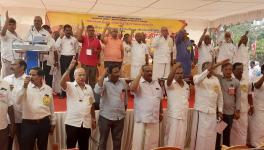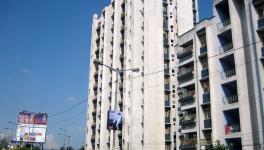TN: Chennai Corporation’s Efficiency in Flames After Perungudi Dumpyard Fires
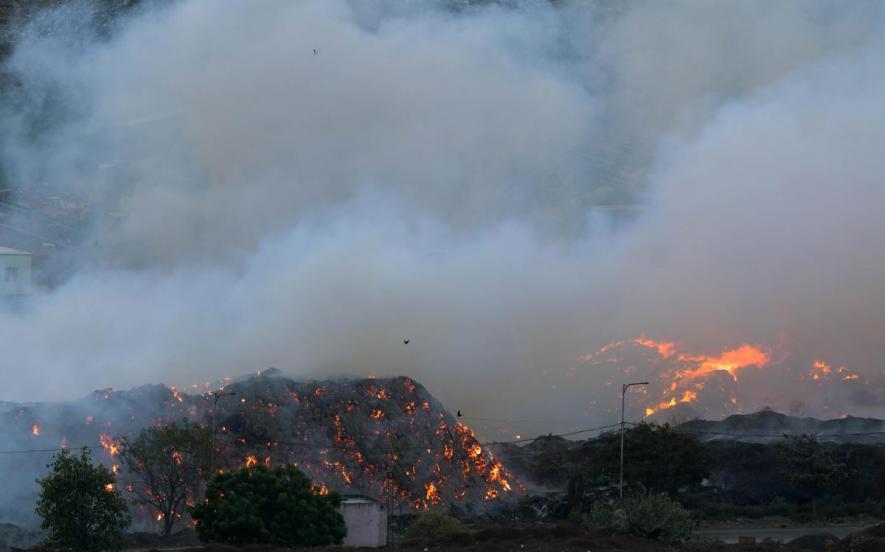
The burning dumpyard in Perungudi, Chennai. Image courtesy: BusinessLine
The massive landfill in Perungudi, a locality in South Chennai, caught fire on April 27. The Greater Chennai Corporation (GCC) struggled to bring it under control. Concentrated toxic fumes spread over a radius of 6 km above the burning debris. The Velacherry neighbourhood near Perungudi and the Pallikaranai marshland were the most affected.
The smoke has the potential to affect the native flora and fauna and the health of the urban residents.
“Children below the age of five, persons with cardio-respiratory conditions, asthmatic patients, people with weak immunity, etc., can be particularly affected by the smoke they are now being exposed to,” said environmentalist activist Nityanand Jayaraman.
“The cause of the fire is against the law. It reveals that biodegradable waste is dumped into the landfill. According to GCC solid waste management guidelines, biodegradable waste should not be dumped there. The biodegradable waste remains in garbage dumps for weeks and months, and when it breaks down, it releases heat, which raises the temperature. This garbage cannot
breathe because more garbage is dumped on top of it. It creates methane pockets and burns spontaneously,” says Jayaraman.
The Perungudi municipal landfill was brimming and overflowing with 3.63 million cubic metres of waste when it caught fire, and this is not the first time.
Jayaraman said that the water thrown on the fire increases the flammability of such garbage and will not help extinguish the fire. This led to increased fire, smoke and air pollution from the dump last week.
GCC FLOUTS RULES
The ever-righteous judiciary did not see contempt of court in the Perungudi dumpyard fire, but have been involved in evicting poor people, citing encroachment. Meanwhile, the Chennai Corporation keeps having a ball.
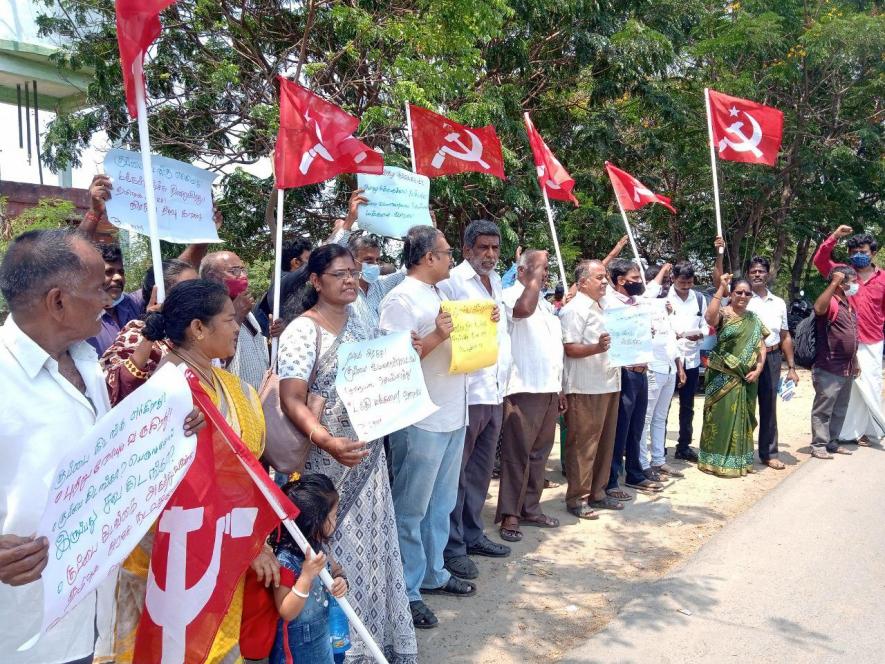
Protest held by CPI(M) outside the Perungudi dump on April 29
With Perungudi as the centre, solid waste is dumped within Chennai city's limits. Around 4,500 tonnes of solid waste is dumped every day by the city Corporation without any segregation or recycling. It swallows the Pallikaranai freshwater marshland at the rate of four hectares/year.
In 1970, the corporation allotted seven hectares of land in Seevaram village in Perungudi for dumping waste, and it was bypassed in 1980 when the nearby marshland was occupied. The garbage dumping area increased to 56 hectares in 2002 and 136 hectares by 2007. The National Productivity Council reported that 70 lakh tonnes of solid waste were dumped at the site till 2005.
At a meeting chaired by the then chief secretary in 2005, it was decided that the corporation should not dump solid waste beyond 74.13 hectares in freshwater swamps. Unfortunately, the corporation defied the order.
BREAST MILK BECOMES POISON
Household waste is minimal in the Perungudi dumpyard. Dangerous diseases are spreading due to excessive dumping of industrial and medical waste. Metal, copper and mercury levels are high in the groundwater due to seepage. The drinking water in the wells in the locality is severely degraded and found in several colours - yellow, green, black and red.
Twenty-seven types of chemical waste are dumped here, and such waste exceeds several times the limit set by the United Nations Environment Programme (UNEP). Particularly, the amount of three cancerous chemicals is 34,000 times higher than the defined limit.
A University in Japan recently carried out a study on breast milk samples collected from Perungudi in Chennai and areas in Cambodia, the Philippines and others. The study identified Perungudi as the locality with the most hazardous chemical wastes. The breast milk of some of the women from the neighbourhood contained a dangerous chemical called dioxin.
Studies show that blue baby syndrome is more prevalent in the region from adulterated breast milk. The disease causes failure and perforation of the heart, and lack of oxygen leads to haemoglobin deficiency, causing death in infants. These are caused by consistently consuming water mixed with chemical leakages from the dump.
Some harmful diseases are spreading through the air from chemical waste that is not fully burnt, i.e. products of incomplete combustion (PIC). Its impact can be felt up to 1,000 miles from the dumpsite. To reduce the amount of garbage, the Chennai Corporation sets fire to it from time to time. But it throws the blame on the rag-pickers there.
Although former chief minister J Jayalalithaa re-named the corporation as ‘Greater’ Chennai Corporation’, nothing has changed on the ground.
On November 12, 2002, the state government issued an order to protect wetlands. It was a farce. Occupations were not evicted from the wetland. Garbage dumping did not stop. Sewage was not blocked. The same story continues.
WHAT IS THE SOLUTION?
Solid waste is not mere garbage. With intense urbanisation accompanied by the ruling paradigm of globalisation and neoliberalism, cities have become the symbol of wealth and the site of exploitation. At such a time, urban waste is a major issue.
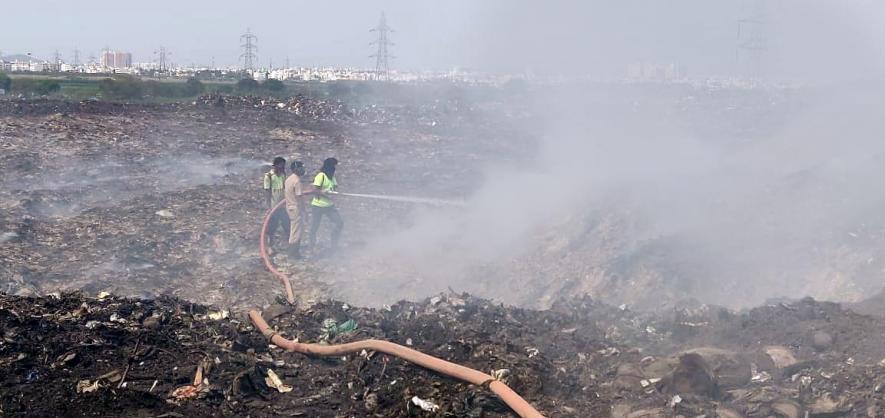
Firefighters in action, Image courtesy: ANI
That is why the concept of ‘waste management was conceived. It should be kept in mind that when the Chennai Corporation was established, it started to collect a waste tax from the people.
At present, what are the possibilities for handling waste?
-
Many laws and schemes are already in place. The first thing is to put them to practice.
-
Solid waste management is one of the many departments of the GCC. Particular attention should be given to it.
-
The landfills need to be relocated. Chennai receives more than 5,500 metric tons of solid waste/day, dumped in Perungudi and Kodungaiyur.
Solid waste dumping in landfills includes separating the liquids leaking from the debris and storing them with facilities to purify them.
In the landfill method of solid waste disposal, there would be measures to keep off insects and prevent foul smells from emanating and mixing with fresh air.
Groundwater would be tested periodically, and systems would be in place to prevent adulteration.
But the solid waste complexes in Perungudi and Kodungaiyur are merely dumping yards and not scientifically established landfills.
-
More solid waste complexes must be set up in different places employing the landfill method. Setting up large complexes in a concentrated place must be avoided. There are more features to the landfill method which should be incorporated.
-
Biodegradable waste and non-biodegradable waste must be segregated and maintained separately.
-
Industrial, medical, chemical, and organic waste must be segregated and handled separately.
-
Solid waste management should be decentralised. At the zonal levels, recycling systems should be set up.
-
Laws should be enacted to ensure that biodegradable waste is taken care of in the residential areas, especially in gated communities and apartment buildings.
-
A method should be in place where the companies can recall plastic and other recyclable materials. Tamil Nadu government’s dairy cooperative Aavin used to recall plastic milk packets. This will significantly improve recycling, and the government should formulate and implement rules for this.
-
The plan to segregate household waste into biodegradable and non-biodegradable has come to a halt with mere announcements. This practice must be adequately enforced.
Laws and regulations related to solid waste should be tightened, strictly enforced and implemented so that they are 100% applicable to the authorities and the government.
In India, solid waste management is carried out well in some states, such as Kerala. The government of Tamil Nadu should take steps to implement the above points to improve waste management.
A Bakkiam is a state committee member of CPI(M) Tamil Nadu. He is an expert on urban environmental and developmental issues.
Translated from Tamil to English by Sruti MD
Get the latest reports & analysis with people's perspective on Protests, movements & deep analytical videos, discussions of the current affairs in your Telegram app. Subscribe to NewsClick's Telegram channel & get Real-Time updates on stories, as they get published on our website.











